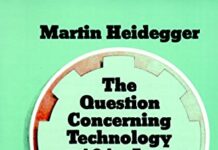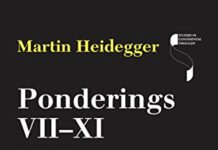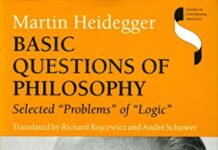
Ebook Info
- Published: 2091
- Number of pages: 176 pages
- Format: PDF
- File Size: 10.90 MB
- Authors: Martin Heidegger
Description
The text of Martin Heidegger’s 1930-1931 lecture course on Hegel’s Phenomenology of Spirit contains some of Heidegger’s most crucial statements about temporality, ontological difference and dialectic, and being and time in Hegel. Within the context of Heidegger’s project of reinterpreting Western thought through its central figures, Heidegger takes up a fundamental concern of Being and Time, “a dismantling of the history of ontology with the problematic of temporality as a clue.” He shows that temporality is centrally involved in the movement of thinking called phenomenology of spirit.
User’s Reviews
Editorial Reviews: Review ” . . . an important contribution . . . offers a penetrating glimpse into certain uncharted waters in the development of German thought.” ―Review of Metaphysics “A must for all students of Hegel, Husserl, and Heidegger.” ―Choice”― About the Author Parvis Emad is Emeritus Professor of Philosophy at DePaul University and author of Heidegger and the Phenomenology of Values. He is founding editor with Kenneth Maly of Heidegger Studies.Kenneth Maly is Professor of Philosophy at the University of Wisconsin-LaCrosse and editor (with Parvis Emad) of Heidegger on Heraclitus: A New Reading.
Reviews from Amazon users which were colected at the time this book was published on the website:
⭐A POSTMODERN LOOK AT HEGEL THROUGH THE EYES OF HEIDEGGER: 1930:This lecture series was given by Heidegger in 1930 and ended up being a world-event that changed the way we appropriate Hegel. These lectures were later picked by the French post-modern movement. Therefore this book is a substrate of essential significance for all post-modern thought; and every post-modern writer. I’ll give you the post-modern “moments” according to Heidegger’s reading: 1. Sensual-intuition; 2. Absolving-gaze; 3. Dialegesthai-unity; 4. Dialectic-hermeneutic;. Axis-logic; 5. Thinking-meaning; 6. Understanding-logos; 7. Self-consciousness-judgment; 8. Reason-as-absolute-spirit/at composition threshold.Take your time and absorb these profound lectures. This is the work that changed 21st century thinking. Heidegger was the “bridge” between Husserl and Hegel. An extremely important “bridge”. This is 5 stars or more; and it is required reading for anyone interested in thought for the emerging post-modern position. Please enjoy a masterful lecture series
⭐Here is another book of philosophy lectures with no index. The Contents has a lot of section number and titles, but the possibility of some confusion is already obvious in the title for section 3, “The significance of the first part of the system with regard to the designation of both its titles.” (p. v, pp. 17-26). This still relates to the early part of the Introduction before “Preliminary Consideration” (p. v, pp. 32-42), which consists of section 5, “The presupposition of the Phenomenology: Its absolute beginning with the absolute.” If this seems excessive in the substitution of words for whatever this series of lectures is supposed to be about, there is a little chart of the basic Phenomenology-system at the bottom of page 7 which shows how Part I of Hegel’s philosophy, his book, PHENOMENOLOGY OF SPIRIT, is merely an introduction to the Encyclopedia-system, which Hegel originally called Part II, before it was written, but which was divided in three parts, Logic, Philosophy of Nature, and Philosophy of Spirit, in the Encyclopedia which included Phenomenology of Spirit as merely “The second section of the first part (subjective spirit)” (p. 7) of the three main divisions included “in the transformed system of philosophy.” (p. 7). Heidegger admits that this is a very philosophical move:”But should one not say then that Hegel already at the beginning of his work presupposes and anticipates what he wants to achieve only at the end? Certainly this must be said. Indeed, whoever wishes to understand anything of his work must say that again and again. The attempt to diminish this `fact’–as we would like to call it–show, furthermore, how little this work has been understood. . . . For it pertains to the essential character of philosophy that wherever philosophy sets to work in terms of its basic question and becomes a work, it already anticipates precisely that which it says later.” (p. 30).These lectures on Hegel’s first major work “constitutes the lecture course given by Heidegger at the University of Freiburg during the winter semester of 1930/31. The German edition, edited by Ingtraud Goerland, was published in 1980 by Vittorio Klostermann Verlag.” (p. viii). Normally publication dates matter little in philosophy, and the English translation did not appear until 1988, but the publication in German in 1980 might be considered an answer to specific questions raised by hotshot American philosopher and Princeton professor Walter Kaufmann, near the end of his life, who published a three-volume set in 1980 called Discovering the Mind, after some of the ideas were presented in 1974 and the first draft was completed in 1976, in which Hegel was considered too rushed to be considered philosophical: “especially in his first book he came to write at such a pace that he put fleeting thoughts and doubtful notions down on paper and then had to send them to the printer without any opportunity to rethink what he had written.” (DM, V. I, pp. 255-256). Volume II made the same points regarding the publication of Heidegger’s first original work, only half a system in which “Heidegger secularized Christian preaching about guilt, dread, and death, but claimed to break with two thousand years of Western thought.” (DM, VII, p. xvi). Privately, in “an unpublished letter that Heidegger had written to Karl Loewith on August 19, 1921” (DM, VII, p. 170), Heidegger had written “but it must be added that I am no philosopher, and I do not imagine that I am doing anything remotely comparable; that is not my intention. . . . I am a `Christian theologian.’ ” (DM, VII, p. 171).It should be obvious that Heidegger was capable of recognizing systems and identifying them quite easily. In HEGEL’S PHENOMENOLOGY OF SPIRIT, he has titles in his Contents that call out: “the System of Science,” “1. The system of the phenomenology and of the encyclopedia,” “2. Hegel’s conception of a system of science,” “b) Absolute and relative knowledge. Philosophy as the system of science,” “4. The inner mission of the phenomenology of spirit as the first part of the system.” Such an understanding of systems is entirely philosophical, and Heidegger’s defense of his BEING AND TIME in the final few pages of these lectures is entirely philosophical in nature. He was not supposed to be writing about himself, but about the philosophical “problematic of `being and time’ ” (pp. 146-147) which previously flared up “for the first and only time, namely, in Kant–people refuse to see the problem and speak rather of my arbitrarily reading my own views into Kant. There is something peculiar about the lack of understanding in our contemporaries by virtue of which one can become famous all of a sudden, and indeed in a dubious sense.” (p. 147). That he could complain about being famous as a philosopher already in 1931, before any notoriety from political scandals could make the picture as messy as a German mentality would be a few years later, tends to show that Heidegger had a better grasp of philosophical matters than any of his competitors, of whom only Karl Jaspers, the famous doctor-philosopher whose books include one on GENERAL PSYCHOPATHOLOGY, springs to mind as truly great.Heidegger pictures Hegel’s first book as a process of creeping up on absolute knowledge. “Hence, the work ends with the short section DD, which is entitled `Absolute Knowledge.’ ” (pp. 32-33). This leads up to the main assignment:”In this lecture course I presuppose such a first reading of the entire work. If such a reading has not taken place or does not take place in the next few weeks, there is no sense in sitting here: You cheat not only me but yourselves. However, the first reading is not a guarantee that with the second reading we really understand the work. Perhaps the first reading must be frequently repeated, which is only to say that the first reading is utterly indispensable.” (p. 36).
⭐I’m not sure if the translation to English hurt this book. Hard to read
⭐Hegel’s Phenomenology of Spirit is one of the pivotal works of philosophy, and Heidegger is one of the pivotal philosophers in history. Whilst Heidegger’s works are technically dense and suffer from translations issues at times, he remains one of the greatest and influential thinkers in Western academia.It’s helpful to have some knowledge of Heidegger’s work before reading this (especially Being & Time), but unlike his works on Nietzsche this is less about the author than the subject. The ideal scenario is to have read Hegel’s Phenomenology once, then read this and re-read Hegel. Heidegger was an excellent thinker and his analysis of Hegel’s work is carried out with care and consideration for his students. This really is a master class in inspirational teaching, bringing the text to life and imbuing it with a vibrancy that is genuinely captivating.The onus of this text is certainly on Hegelian studies rather than insights into Heidegger’s work (though those insights are apparent in subtle ways). Anyone looking for clarification on the Phenomenology can do a lot worse than turning to this exceptional and focussed work from a teacher and thinker of the highest level.
Keywords
Free Download Hegel’s Phenomenology of Spirit (Studies in Phenomenology and Existential Philosophy) in PDF format
Hegel’s Phenomenology of Spirit (Studies in Phenomenology and Existential Philosophy) PDF Free Download
Download Hegel’s Phenomenology of Spirit (Studies in Phenomenology and Existential Philosophy) 2091 PDF Free
Hegel’s Phenomenology of Spirit (Studies in Phenomenology and Existential Philosophy) 2091 PDF Free Download
Download Hegel’s Phenomenology of Spirit (Studies in Phenomenology and Existential Philosophy) PDF
Free Download Ebook Hegel’s Phenomenology of Spirit (Studies in Phenomenology and Existential Philosophy)




